Uber Sets $50 Billion Valuation Target In New Funding Drive
Uber, the mobile phone based car service that has upended the taxi industry across the nation and around the world, is raising another round of funding from private investors, and aiming for a valuation of $50 billion:
Uber Technologies Inc., the world’s most highly capitalized startup, plans to raise another large round of funding.
The San Francisco-based ride-sharing company briefed investors on its plans to raise between $1.5 billion and $2 billion in new funding, said people familiar with the matter. It expects the funding to value the company at $50 billion or higher, the people said, although they said Uber’s plans could change.
At that level, Uber could become the most valuable venture-backed startup in history. Only Facebook Inc. attained a $50 billion valuation before going public. Goldman Sachs Group arranged a private offering of shares of the social network at that valuation in 2011.
Uber’s valuation could rise as it meets with investors, the people said. A May 2014 funding round began with discussions of a roughly $10 billion valuation and closed at an $18 billion valuation. A round in December 2014 began at around $30 billion and closed at $41 billion.
While of a similar scale, Uber’s round would far surpass Facebook in terms of how highly valued it is relative to its revenue. Facebook, when it raised money at a $50 billion value in early 2011, was worth about 25 times its prior-year revenue of $2 billion. Uber, meanwhile, had revenue—after accounting for how much it pays drivers—last year of roughly $400 million, The Wall Street Journal has previously reported. That means Uber may now worth more than 120 times its trailing revenue.
Facebook also turned a $600 million profit in 2010, while Uber has been losing money, The Wall Street Journal has reported.
This revenue multiple may a reflection of Uber’s faster growth potential. Uber has told some investors it expects revenue to grow 400% to $2 billion this year, The Wall Street Journal has reported. Facebook grew revenues by 89% the year it was valued at $50 billion. But some venture capitalists have also said that valuations are reaching frothy levels driven by “fear of missing out” on fast-growing companies.
Uber has matched an aggressive expansion into some 250 markets around the globe with a ferocious fundraising machine, securing more than $5 billion in debt and equity from investors in the five years since launching.
The company has spent big on marketing the service to riders and prospective drivers, offering subsidized promotions like a $5 flat-fee carpooling option to compete with ride-sharing rivals such as Lyft Inc.
(…)
In recent months, Uber also has boosted its investment in developing new technologies, including a partnership with Carnegie Mellon University to build robotic cars and new mapping software. In March, the company announced its purchase of a 40-person mapping startup called deCarta, its first publicly disclosed acquisition. It also is bidding as much as $3 billion for Nokia’s Here mapping subsidiary, which is dominant in car navigation systems.
Another major difference between Uber and Facebook, of course, is the fact that Uber’s method of revenue generation is far easier to understand that Facebook’s, which relies largely on the ephemeral world of online advertising and depends to no small degree on advertisers continuing to believe that paying to advertise online at the rates Facebook is demanding is a worthwhile investment on their part. Uber, on the other hand, generates hard cash from providing a service, and for the most part has been able to do that in a manner that has proven to be highly popular, especially among younger consumers, people who live in large cities and heavily populated suburban areas, and those who are very into technology. While it’s likely that other market entrants will find their own ways to compete against Uber in this market, and with the arrival of companies such as Lyft that has already happened, Uber will always benefit from being the first entrant in the market and the brand loyalty that has helped generate. The expansion of this business, someday, into a network of driverless cars available at the call of an app, could prove to be somewhat revolutionary.
Eventually, of course, Uber will go public.. I would anticipate that will be an IPO that will get nearly as much media attention as Facebook’s did, if not more.
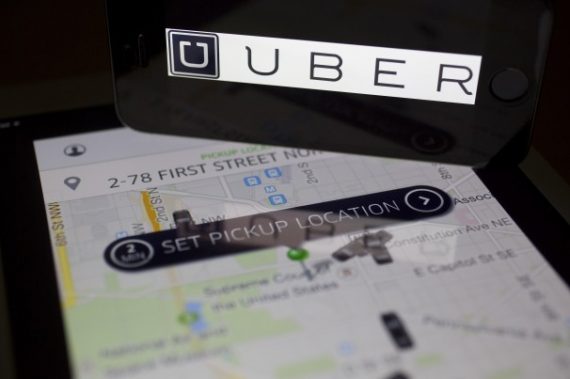


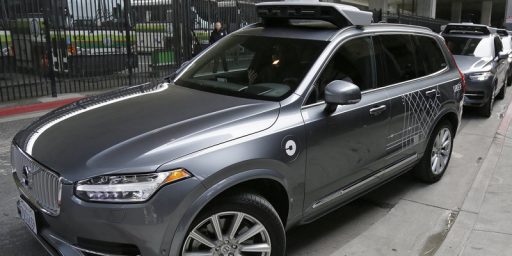
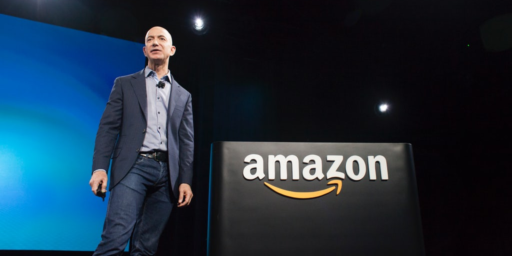
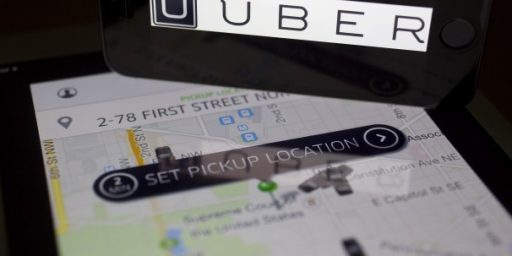
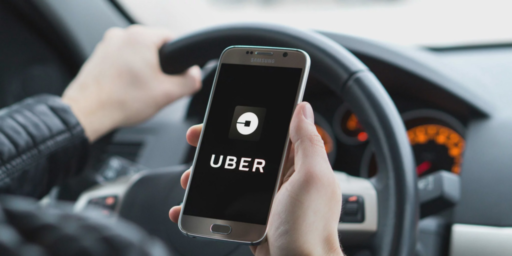
The technology changed. We don’t need drivers who know their way around, we have GPS for that. And tapping an app is obviously superior to standing in the freezing rain in Manhattan waving futilely at passing cabs.
Further, just about every cab company I’ve dealt with outside of London, runs filthy, decrepit cars and hires smelly drivers with no social skills. Cab company dispatchers are universally rude.
I can’t work up much pity for an industry that is so miserable at performing its core function. Anywhere but London I summon Uber. It’s a clever idea, well-organized, and it provides a necessary service. I don’t know if it’s worth 50 billion or not, but it deserves to survive and the cab companies deserve to go under.
@michael reynolds: Taxi service is part of any city’s transportation plan, filling in where busses cannot go, and giving people who do commute by public transportation a way to get about faster if there is a minor emergency (child care problems, etc). Without a taxi system in place, more people would have to commute by car. It is why taxis and taxi fares are regulated in most cities.
The working poor cannot afford Uber. They cannot afford the smart phones with the data plans to even get the app in many cases. Uber doesn’t meet their needs.
That said, it is a hundred times more convenient. A better experience all around. At least the full Uber. Uber X is a little sketchy.
@michael reynolds:
Yep I completely agree. Taxi service in D.C. is a massive joke at times. Heck ,it was only until about two or three years ago that cabs were even equipped to accept credit cards. And it’s not much better in Northern Virginia. I’m far from a Uber “power user” but the times I have used it its’ been quick, efficient, and quite honestly more pleasant than any taxi ride I’ve ever taken.
If the taxi companies were smart, they would look at what Uber and Lyft are doing and change their own practices. Instead, they try to use government to shut down competition.
@Doug Mataconis:
At least in Seattle, the “ride-sharing” system of Uber X and left was just patently illegal when they began operating in this market. And when the city council was considering legislation to legalize it to a smaller degree than the companies wanted, Uber sponsored a referendum to open it up much further.
I still wish our local police had just requested a few dozen Lyft and Uber X rides, and then arrested the drivers at that point. Bonus points if they could have charged corporate executives with conspiracy charges.
They operate in a “laws don’t apply to us” mode, and I just hate the smug little f*ckers. Of course, the real taxi services are so incompetent that I would sooner sacrifice my moral views than deal with them… I’m torn — personal morality or actually being able to get somewhere without hassle.
@Doug Mataconis:
There is an app in Brazil that´s is basically Uber for taxi drivers – you use the app to call a cab to go to where you are. There are stories of cab drivers using the cell numbers of customers to sexually harass them.
@Gustopher: The working poor cannot afford Uber. They cannot afford the smart phones with the data plans to even get the app in many cases. Uber doesn’t meet their needs.
I have a $30,00 smart phone running Droid 4.4. And service for it costs $45/month. That isn’t that great an expense for unlimited talk, text, and 3GB of data at 3G speed, then 2G speed for the rest of the 30 days.
So it isn’t that great an expense.
$50 billion would buy this country a pretty awesome transportation system.
Or we could give it to people who think they “revolutionized” the industry by making it easier to call a cab driver. The company is too susceptible to regulatory and competitive pressures to take it seriously long-term. The only reason to buy this stock is to make money buying low, selling high.
And good luck with that in this case.
@James Pearce: $50 billion would buy this country a pretty awesome transportation system.
And all you’d have to do is take that $50 billion from the people who have it and, instead of spending it how they want it spent, spend it on what you want to spend it for.
The problem is that first user network effects really only work when there’s a value associated with the network. People join Facebook because their friends are on Facebook and they send stuff to each other.
Unless Uber adds a social media network to its connectivity, there’s no real advantage in the network aspect. It’s a taxi-call app. Which means that any competitor down the pipeline with a more efficient taxi-call app is going to take over the market.
Besides which, there’s a lot of legal questions that Uber is getting hammered with which could potentially trash their profitability immediately. At the moment, they’re making out like bandits because they’ve shoved most of the expenses back on the drivers and are taking a huge chunk of the fares. If the drivers were to be ruled to be employees rather than “independent contractors”, Uber’s profit margin would drop considerably.
Anyone who decides to get in on this next round of financing of Uber is an absolute lunatic.
@Jenos Idanian #13:
Is that what you thought I meant?
It’s even simpler than that. Investing in something that may become another Aereo (that is, a disruptive technology that’s in danger of being regulated out of existence) is a dumb idea. Read up on what’s going on in Kansas in regards to Uber before you sign up for the IPO.
Although, it occurred to me that there’s a second reason to invest in Uber, besides the desire to get hosed, and it’s to fill the war chest for the inevitable fight with City Hall. It’s a bad bet and the suckers who make it are going to make some other dudes very rich.
$50 billion is insane. That’s more than all can companies on earth are worth. I haven’t seen overvaluation like this since the Internet bubble of 1998-2000, when pets.com was a solid investment and Priceline.com was worth more than the airlines they sold cheapo tickets for.
@Facebones: I predict the next round beyond the $50 billion will be an almost-immediate IPO, to sell to the
marksgeneral populace before the whole mess collapses.